Unlocking the secrets of arctic climates
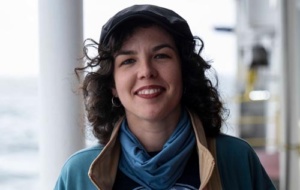 Unlocking the Secrets of Past and Future Arctic Climates
Unlocking the Secrets of Past and Future Arctic Climates
Dr Alba Gonzalez-Lanchas, Research Associate at University College
The International Ocean Discovery Program (IODP) Expedition 403 – Eastern Fram Strait Paleo Archive took place this summer, from June to August 2024, in the Fram Strait. A team of 25 researchers from countries including Australia, China, Germany, India, Italy, Japan, Norway, Spain, the UK, and the USA participated in the expedition aboard the legendary research vessel Joides Resolution.
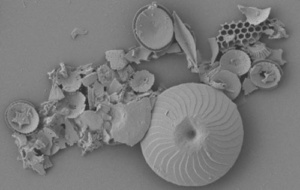
Calcareous nannofossils preserved in sediments
Dr Alba Gonzalez-Lanchas, a Research Associate at University College and a Postdoctoral Researcher in Paleoclimatology and Geochemistry in the Department of Earth Sciences, was one of the participants, representing the UK IODP. Dr Gonzalez-Lanchas specializes in the study of calcareous nannofossils – tiny, fossilized phytoplankton algae – helping to determine the age of sediments and build climate timelines from the materials drilled during the expedition.
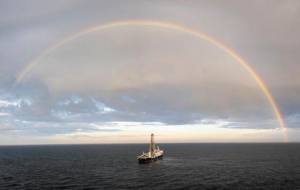
The JOIDES Resolution surrounded by a rainbow during Expedition 403. Credit – Chris Lyons & IODP
Located between Greenland and Svalbard, the Fram Strait is a crucial gateway link between the Arctic Ocean and the North Atlantic. Today, a warm current flows northward through this strait, bringing heat, moisture, and salt to the Arctic, which influences both regional and global climate systems. The Arctic is currently warming nearly four times faster than the rest of the planet. A key to understanding how the ocean in this region contributes to Arctic warming lies beneath the seafloor, in layers of sediment that have built up over millions of years. During IODP Expedition 403, scientists successfully drilled a total of five kilometres of sediment at six different sites in the Fram Strait. These sediments, which span the last five million years of Earth’s history, offer an unprecedented record about the evolution of past climates in a pivotal region for global climate.
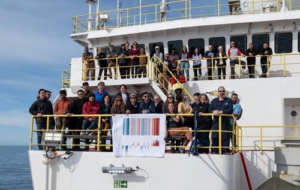
The Expedition 403 science party members and technical staff. Credit – Tiffany Liao, IODP JRSO
The outcomes from Expedition 403 are expected to push the frontiers in knowledge of climate dynamics and improve our understanding of how the ongoing warming of the Arctic will evolve in the coming years. Working in the research group of phytoplankton biogeochemistry – OceanBug – lead by fellow Professor Rosalind E.M. Rickaby, Univ Professorial Fellow and Chair and Professor of Geology, and in collaboration with an international team of scientists, Alba Gonzalez-Lanchas will conduct a research project at the University of Oxford.
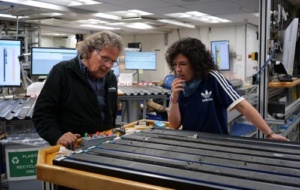
Alba Gonzalez-Lanchas discussing the sedimentary cores with Prof. Yair Rosenthal (Rutgers University). Credit – Khyber Jones & IODP
The project aims to investigate past periods of warming by studying the representation, morphology and chemical composition fossilized remains of ancient phytoplankton in the sediments from Expedition 403. This work will shed light on how the Arctic environment responded to climate forcing in the past, helping to predict how it might react to future climate changes.
Published: 3 October 2024
